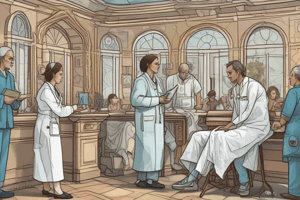Podcast
Questions and Answers
What was the primary focus of the author in the publication of Percival?
What was the primary focus of the author in the publication of Percival?
- The impacts of the Second World War
- The development of bioethics as a discipline
- The relationship between physician and patient (correct)
- The technical progress in the medical field
What significant event prompted a philosophical-moral reflection on medical practices after the Second World War?
What significant event prompted a philosophical-moral reflection on medical practices after the Second World War?
- The economic boom in the United States
- The genocide of millions of people (correct)
- The formation of the European Union
- The establishment of medical schools
When was the Universal Declaration of the Rights of Man adopted by the United Nations?
When was the Universal Declaration of the Rights of Man adopted by the United Nations?
- January 1, 1950
- December 31, 1949
- December 10, 1947
- December 10, 1948 (correct)
Who first coined the term 'bioethics'?
Who first coined the term 'bioethics'?
Why is ethics important at an organizational level?
Why is ethics important at an organizational level?
Which setting is NOT typically associated with physical therapy?
Which setting is NOT typically associated with physical therapy?
What is the primary objective of physical therapy?
What is the primary objective of physical therapy?
Which of the following does NOT describe the interaction in physical therapy?
Which of the following does NOT describe the interaction in physical therapy?
Which of the following is NOT a responsibility of a physical therapist?
Which of the following is NOT a responsibility of a physical therapist?
What is an essential quality of a physical therapist when working with patients?
What is an essential quality of a physical therapist when working with patients?
What knowledge area must physical therapists demonstrate expertise in?
What knowledge area must physical therapists demonstrate expertise in?
Why is the power of observation important for physical therapists?
Why is the power of observation important for physical therapists?
Which quality indicates a physical therapist's ability to collaborate within a medical team?
Which quality indicates a physical therapist's ability to collaborate within a medical team?
Which of the following practices can a physical therapist engage in to promote public health?
Which of the following practices can a physical therapist engage in to promote public health?
What character trait helps a physical therapist handle patient complaints effectively?
What character trait helps a physical therapist handle patient complaints effectively?
What aspect of time management is essential for physical therapists?
What aspect of time management is essential for physical therapists?
What is a primary focus of physical therapists in relation to individuals at risk of altered movement behaviors?
What is a primary focus of physical therapists in relation to individuals at risk of altered movement behaviors?
Which of the following best defines the scope of practice for physical therapists?
Which of the following best defines the scope of practice for physical therapists?
Which activity is part of the physical therapist's scope of practice?
Which activity is part of the physical therapist's scope of practice?
How might the practice scope of a physical therapist change over time?
How might the practice scope of a physical therapist change over time?
What objective is NOT typically associated with the role of a physical therapist?
What objective is NOT typically associated with the role of a physical therapist?
Which of the following is a responsibility that falls under patient management for physical therapists?
Which of the following is a responsibility that falls under patient management for physical therapists?
In the context of physical therapy, what does evaluation involve?
In the context of physical therapy, what does evaluation involve?
What is one of the key goals of interventions provided by physical therapists?
What is one of the key goals of interventions provided by physical therapists?
What is the primary emotional reaction a physical therapist should have towards patients?
What is the primary emotional reaction a physical therapist should have towards patients?
Which of the following best describes a physical therapist's professional duty?
Which of the following best describes a physical therapist's professional duty?
What is a core value that emphasizes the importance of lifelong learning for physical therapists?
What is a core value that emphasizes the importance of lifelong learning for physical therapists?
In terms of integrity, what should a physical therapist avoid?
In terms of integrity, what should a physical therapist avoid?
Which action reflects the core value of altruism in physical therapy?
Which action reflects the core value of altruism in physical therapy?
What does accountability in physical therapy entail?
What does accountability in physical therapy entail?
Which core value involves the physical therapist treating all individuals with respect, regardless of their background?
Which core value involves the physical therapist treating all individuals with respect, regardless of their background?
What is NOT a responsibility of a physical therapist regarding patient treatment?
What is NOT a responsibility of a physical therapist regarding patient treatment?
What is one of the primary reasons ethical principles are important in physical therapy?
What is one of the primary reasons ethical principles are important in physical therapy?
Which ethical principle emphasizes acting in the best interest of the client?
Which ethical principle emphasizes acting in the best interest of the client?
What is a common source of ethical dilemmas in clinical practice?
What is a common source of ethical dilemmas in clinical practice?
Which principle is concerned with preventing harm to patients?
Which principle is concerned with preventing harm to patients?
In addition to respecting autonomy, what other ethical principle is crucial for effective clinical decision-making?
In addition to respecting autonomy, what other ethical principle is crucial for effective clinical decision-making?
How can physical therapists ensure accountability to the public?
How can physical therapists ensure accountability to the public?
What is a key aspect of understanding ethical principles in healthcare?
What is a key aspect of understanding ethical principles in healthcare?
Which of the following is NOT an ethical principle outlined in medical ethics?
Which of the following is NOT an ethical principle outlined in medical ethics?
Flashcards are hidden until you start studying
Study Notes
The Rise of Bioethics
- Percival was a publication that explored the physician-patient relationship.
- The need for a philosophical and moral reflection on the relationship between science and humanity arose in the aftermath of World War II.
- The Universal Declaration of Human Rights (1948) was a significant reaction to atrocities committed during the war.
- Bioethics, as a new discipline, emerged as a response to the ethical challenges posed by advancements in biological and medical sciences.
- Van Rensselaer Potter, an oncologist, coined the term "bioethics" in the 1970s.
Importance of Ethics
- Promotes a sense of well-being for individuals and professions
- Strengthens the credibility and trustworthiness of professions
- Fosters good business practices, leading to better long-term performance
Physical Therapy: Scope and Practice
- Physical therapy involves the rehabilitation and restoration of movement and functional abilities across the lifespan.
- Physical therapists collaborate with patients, families, and other healthcare professionals to assess and treat movement impairments.
- Treatment settings include hospitals, nursing homes, rehabilitation centers, outpatient clinics, and community settings.
- Focus areas for physical therapists:
- Promote individual and societal well-being
- Prevent disabilities and functional limitations
- Restore and enhance movement and function, minimizing incapacity and improving quality of life
The Scope of Practice
- Scope of practice encompasses the areas where a physical therapist has the necessary knowledge, skills, and experience to practice safely and effectively.
- The scope of practice for physical therapists includes:
- Diagnosing and managing patient conditions
- Restoring and maximizing physical function
- Preventing, minimizing, and mitigating the effects of health conditions
- The scope of practice evolves over time, with experienced therapists often specializing in specific areas.
Examples of Physical Therapy Scope of Practice
- Examination: History taking, physical assessments, and diagnostic testing
- Evaluation: Interpreting findings, establishing diagnosis, and developing treatment plans
- Treatment: Implementing therapeutic interventions to address impairments and functional limitations
- Prevention: Preventing injury and disability, promoting fitness and well-being
- Consultation, Education, and Research: Providing professional expertise, educating patients and colleagues, and engaging in research
Qualifications of Physical Therapists
- Knowledge: A strong understanding of anatomy, physiology, pathology, biomechanics, and various physical therapy modalities
- Communication Skills: Effective communication with patients, other medical professionals, and colleagues
- Teamwork: Collaboration with other healthcare professionals to achieve shared goals
- Time Management: Effective organization and time allocation
- Honesty: Ethical conduct, truthful communication, and integrity
- Patience: Ability to tolerate delays, frustrations, and challenges with patients
- Tact: Skillful communication and interpersonal interactions
- Creativity: Problem-solving and developing innovative solutions for patients
- Enthusiasm: Passion for the profession and helping others
- Helping Others: Strong desire to improve patient well-being
- Observation: Keen observational skills to identify patient problems and monitor progress
- Emotional Regulation: Maintaining professionalism and empathy in interactions with patients
- Physical Fitness and Endurance: Strong physical fitness to meet the demands of the profession
- Adherence to Ethics: Following the ethical code of the profession and differentiating between clinical and ethical decision-making
Professionalism in Physical Therapy
- Core Values:
- Social Responsibility: Contributing to meeting public health needs
- Professional Duty: Fulfilling legal and professional obligations
- Excellence: Continuous learning, skill development, and competence
- Compassion & Caring: Respect for all individuals and empowering patients in healthcare decisions
- Integrity: Ethical conduct, confidentiality, and respect for others
- Accountability: Adherence to laws, regulations, and sound professional judgment
- Altruism: Putting patient interests above personal interests
The Importance of Ethical Dimensions in Professions
- Clear Boundaries: Establish clear ethical guidelines for professional behavior.
- Common Norms: Promote shared values and expectations for behavior.
- Respect within and outside the Profession: Nurture respect within the profession and from external stakeholders.
- Consumer/Client Rights: Protect and uphold the rights and interests of patients.
- Professional Rights and Privileges: Safeguard the rights and privileges of professionals.
Ethical Dilemmas in Clinical Practice
- Ethical dilemmas can arise in various contexts:
- Interpersonally: Between patient and therapist
- Intrapersonally: Internal struggles with ethical challenges
- Interprofessionally: Within interdisciplinary teams
- Intra-organizationally: Within healthcare organizations
- Socio-political: Addressing broader societal issues
Ethical Decision-Making in Healthcare
- Healthcare practitioners should:
- Understand Basic Ethics: Familiarity with core ethical principles like autonomy, beneficence, and non-maleficence
- Reflect on Personal Values: Recognize the influence of personal beliefs and values on decision-making
Four Principles of Medical Ethics
- Autonomy: Patient's right to make their own choices
- Beneficence: Acting in the best interest of the patient
- Non-maleficence: Avoiding harm to the patient
- Justice: Ensuring fair and equitable treatment for all patients
Studying That Suits You
Use AI to generate personalized quizzes and flashcards to suit your learning preferences.




